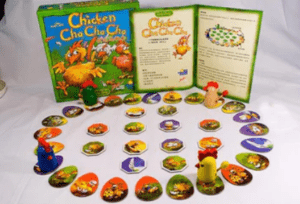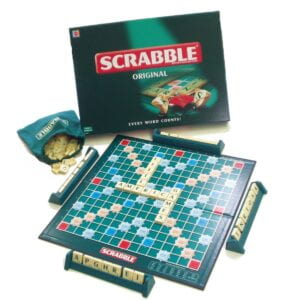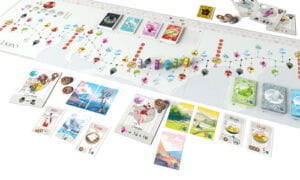CGDD: Board Game Reading & Playing Response



Fieldtrip to the Board Game Club
The games that my group played were Tokaido, Scrabble, and Chicken Cha Cha Cha. Tokaido is a serene and strategic board game where players go on a journey through ancient Japan, and encounter scenic spots, fellow travelers, and cultural experiences. We found that the rules and components of the game to be quite complicated, and often had to refer to the long rule book while playing the game. I think it was cool that the game included so many different aspects like donating coins, purchasing things, taking turns based on your location on the map, way of collecting points, etc. If we had more time, I would learn the game properly. Scrabble is a competitive word game where players strategically form words from letter tiles to score points on a gridded board. It is a game that requires much thinking and planning, but the players must also prepare for unexpected turns of events. Chicken Cha Cha Cha is a children’s memory game that uses dice, tiles, and competitive aspects.
I enjoyed all the games my group played at the Board Game Club, however, I think my favorite one was Chicken Cha Cha Cha because it was extremely simple yet competitive at the same time. The game took me back to my childhood because it reminded me of the time where the internet wasn’t widely accessible and my friends and I would play traditional board games. My entire group also had the most fun playing this game. The basic structure of the game was that there were 12 octagon tiles placed in a circle, with 24 egg tiles inside that were also flipped over. Each player controls one chicken, and each chicken has a tail feather. Method to play the game: player rolls the dice, moves clockwise on the octagon tiles according to the dice number, and must use their memory to flip over the matching egg tile to match the picture on their octagon tile. If the player is correct, they get to go again until they flip a wrong match. To win, you must surpass the other chickens and steal their tail feathers until only one player has all the tail feathers. This game was mostly just a test of memory ( we were aware it was made for little kids), but we found it to be incredibly enjoyable and nostalgic.
Emergent Game Experience
Chicken Cha Cha Cha has some emergent aspects in its game experience because it has unpredictable outcomes, uses a dice to randomly generate the number of tiles a player must move towards, and its player interaction in stealing the tail feathers. The game is based on memory but not so much of strategy, as the egg cards in the middle stay put each round and are only mixed in between rounds to ensure that the outcomes are unpredictable. The game was fun, but I wouldn’t say that Chicken Cha Cha Cha is a prime example of an emergent game experience.
Scrabble, however, does provide more of an emergent gameplay experience because of its limitless creativity, strategic decision making, adaptability, and more. For instance, each player randomly gets 7 letters to make words out of on the board, and must always have 7 letter tiles in their inventory. This prioritizes the randomizing aspect of the game. The place where each tile is placed is also part of strategic thinking, as you can make various words out of your own inventory of letters or build upon the words others have placed onto the board. Depending on the location of your words on the board, you get points according to the number on the letter tiles and the instructions on the board (ex: 3x word points). This game also requires you to adapt to the various different words other players place onto the board, and build upon those words/letters using the random letters you get. There are a variety of situations of scrabble, and the exact same game can never be played twice as the letter tiles are randomized and so are the words built upon others on the game board.
Connection to Video Game Gameplay
Scrabble‘s focus on strategic decision-making, resource management (letters), and dynamic interactions between players are similar to the gameplay mechanics found in strategy and puzzle video games. Players must carefully plan their moves to maximize their points while also adapting to the changing game state and opponent actions.
The journey and exploration elements in Tokaido parallel the adventure aspects often found in open-world video games. Players travel in a visually rich game world, encountering various opportunities and challenges along the way.
Chicken Cha Cha Cha can be compared to puzzle and party games in video games as it emphasizes memory, strategy, and player interaction. Players engage in strategic decision-making and social interaction and compete to collect tail feathers, which is a dynamic gameplay experience found in multiplayer video games.
